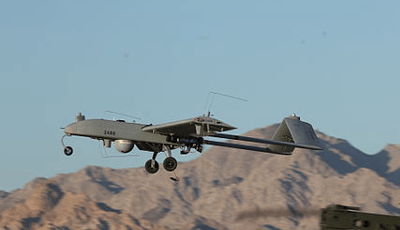Equipping Cops With Weaponized Drones
April 13, 2017
on
on

A police force with weaponized drones in its arsenal may become a reality in Connecticut. Lawmakers of the American state have proposed a bill which would allow law enforcement agencies to use drones equipped with deadly weapons.
The bill was approved by the state legislature's Judiciary Committee on March 29 and has been sent to the House of Representatives.
An earlier draft of the bill called for an all-out prohibition of weaponized drones in the state. But a last minute amendment introduced an exemption for law enforcement officers. The bill states that no one shall operate a drone to ‘release tear gas or to remotely control a deadly weapon’ except for an officer on duty.
North Dakota was the first state to allow armed drones in 2015 but restricted the use to non-lethal weapons such as rubber bullets, Tasers and pepper spray. If the bill passes, Connecticut will be the first U.S. state to allow outfitting drones with deadly weapons.
Not at war
The Connecticut chapter of the American Civil Liberties Union strongly objects against the bill. Executive Director David McGuire said to WCBS Newsradio: ‘We're not in warfare here’. He added that weaponized drones would lower the barrier to use force because law enforcement agents would operate weapons remotely: ‘There’s a level of separation that makes it almost video game like where they’re detached from the actual situation.’
The ACLU did support an earlier version of the bill because it would put restrictions on the use of drones which is currently unregulated in the state. The bill requires a warrant for police drone surveillance and – in the original version – would ban weaponized drones.
Computer security expert Bruce Schneier points out another problem. IT devices often have security vulnerabilities and drones are no exception. He writes: ‘Not content with having a fleet of insecure surveillance drones, the state of Connecticut wants a fleet of insecure weaponized drones. What could possibly go wrong?’
Image: U.S. Marine Corps RQ-7B Shadow unmanned aerial vehicle launches from Speedbag Airfield, California (U.S. Marine Corps photo by Cpl. Richard A. Tetreau/Released)
The bill was approved by the state legislature's Judiciary Committee on March 29 and has been sent to the House of Representatives.
An earlier draft of the bill called for an all-out prohibition of weaponized drones in the state. But a last minute amendment introduced an exemption for law enforcement officers. The bill states that no one shall operate a drone to ‘release tear gas or to remotely control a deadly weapon’ except for an officer on duty.
North Dakota was the first state to allow armed drones in 2015 but restricted the use to non-lethal weapons such as rubber bullets, Tasers and pepper spray. If the bill passes, Connecticut will be the first U.S. state to allow outfitting drones with deadly weapons.
Not at war
The Connecticut chapter of the American Civil Liberties Union strongly objects against the bill. Executive Director David McGuire said to WCBS Newsradio: ‘We're not in warfare here’. He added that weaponized drones would lower the barrier to use force because law enforcement agents would operate weapons remotely: ‘There’s a level of separation that makes it almost video game like where they’re detached from the actual situation.’
The ACLU did support an earlier version of the bill because it would put restrictions on the use of drones which is currently unregulated in the state. The bill requires a warrant for police drone surveillance and – in the original version – would ban weaponized drones.
Computer security expert Bruce Schneier points out another problem. IT devices often have security vulnerabilities and drones are no exception. He writes: ‘Not content with having a fleet of insecure surveillance drones, the state of Connecticut wants a fleet of insecure weaponized drones. What could possibly go wrong?’
Image: U.S. Marine Corps RQ-7B Shadow unmanned aerial vehicle launches from Speedbag Airfield, California (U.S. Marine Corps photo by Cpl. Richard A. Tetreau/Released)
Read full article
Hide full article

About Tessel Renzenbrink
Tessel Renzenbrink is a freelance writer with a focus on the impact of technology on society. She is especially interested in information technology and the transition to a low carbon energy system. For Elektor she is the editor of the columns Elektor Ethics a... >>


Discussion (1 comment)